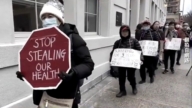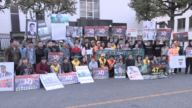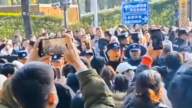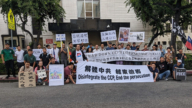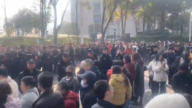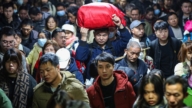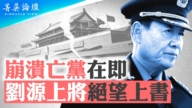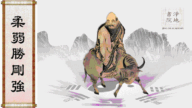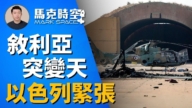【新唐人2014年12月30日訊】長期以來,中國大陸一直因為執行死刑最多、立法上死刑罪名最多、對待死刑犯手段殘忍等等,遭到國際社會和人權組織的譴責。今年十月,中共當局宣佈將取消包括集資詐騙罪、強迫賣淫罪在內的9項死刑罪名,再次引發了海內外有關中國死刑存廢的爭議。
據中共官方的數據公布,中國《刑法》自1997年修訂以來,17年內已經行了9次較大的修改。在今年10月末召開的十二屆全國人大常委會第11次會議上,刑法修正案(九)草案再次被提交併進行了審議。草案的主要內容之一是準備取消9個死刑罪名,一旦審議通過,中國的死刑罪名將由原有的55個,減到46個。
隨著人權觀念的發展,全世界大約有160個國家,都已經廢除了死刑。中國不但保留死刑,而且一直因為在立法上死刑罪名較多、司法上死刑的適用頻率較大、對死刑犯不人道,如摘取器官、冤假錯案頻發等問題而備受國際社會和人權組織的關注。國內外呼籲當局取消死刑的聲音不斷。因此,中國準備取消部分死刑罪名的決定公開後,得到了一些支持廢除死刑人士的認可。
東南大學法學教授張讚寧:「現在當局也認識到這一點,就是殺人太多了,國際輿論以及形象也不好。那麼它在逐步取消死刑罪的罪名,儘管取消的不多,我覺得還是一種進步吧,畢竟還可以少殺一點人。但是55項只取消9項,那麼現在看來,中國還是死刑最多的國家。」
但很快,有聲音質疑,當局打算取消的9項死刑罪名,背後藏有貓膩。據官方媒體報導,這9項準備取消死刑的罪名分別是:走私武器罪、彈藥罪、走私核材料罪、走私假幣罪、偽造貨幣罪、集資詐騙罪、組織強迫賣淫罪、阻礙執行軍事職務罪,以及戰時造謠惑眾罪。取消這幾項罪名的原因是:「這9個死刑罪名幾乎沒有適用或者極少適用,削減起來相對容易。」
民眾紛紛在網上吐槽稱,細看9項罪名,竟然都是與腐敗和黑社會集團相關聯的。這不是在給中共腐敗官員和黑惡勢力發「免死金牌」嗎?
有網民指出,組織強迫賣淫罪是黑社會集團慣用的犯罪手段,通常背後都有官方撐腰,服務的對像也往往是權貴階層,受害者則是貧苦百姓。以曾經轟動一時的「唐慧案」為例,唐慧11歲的女兒被拐騙到有官方背景的娛樂場所被迫賣淫,遭多人輪姦上百次,最終主犯只被法院判處了無期徒刑,一度引發輿論對法院量刑過輕的聲討。這樣喪心病狂的罪行一旦取消了死刑,豈不是令惡人更加猖狂?
憲政學者陳永苗:「原來我們一直在爭論廢除死刑的時候,我們一直擔心廢除死刑,它一定是先廢除貪官的刑,一定是廢除有權力人的死刑。那麼它(中共)廢除這幾個罪名死刑的時候,你可以看到它就符合我們的懷疑和猜測了,它不是說底層民眾的一些死刑被廢除的。」
也有民眾針對集資詐騙罪指出,近年來集資詐騙案接連出現,背後都有中共官方的影子。利如涉及金額上千億,造成受害人上百萬,數十家公司被查封的「天津私募詐騙案」,就被知情人指稱幕後黑手是天津政府。此外還有引起舉國關注的曾成傑案,也被輿論普遍認為是地方政府操縱的一起「替罪羊」案。
陳永苗:「這些都是一些官方或者是有權的人才能幹的到的。所以它取消了這些,可能是有利於這些既得利益集團,或者是有權力的人的輕罪化或者是無罪化,基本上給他們上邊的緊箍咒給拿掉,讓他們在法律之外更加沒有忌憚。」
中國社會活動家胡佳則認為,中共當局取消部分死刑罪名,只是在內外雙重的輿論壓力下對國際社會作出一個姿態,對中國社會人權的改善不具有任何現實意義。
胡佳表示,由於司法的不透明和不公正,只要被當局認為是威脅其政權統治的對像,都可以被冠以吸毒販毒、恐怖襲擊等可以執行死刑的罪名,當前新疆的情況就最為明顯。
採訪/陳漢編輯/張天宇 後製/舒燦
CCP to End 9 Death Penalties—But Who will Have Amnesty?
For a long time, mainland China has been frowned upon by
the international community and human rights organizations
for having the most death penalties, the most death charges
and the cruellest treatment on death row prisoners.
In October, the Chinese Communist Party (CCP) announced
that they were getting rid of nine of their death charges,
including fund-raising fraud, forced prostitution, and others.
This once again, sparked the controversy on the abolition of
the death penalty in China and worldwide.
The CCP’s official data shows that, since their Criminal Law
was amended 17 years ago in 1997, they have made another
nine revisions, the last being in October 2014, in the meeting
of the Standing Committee at the 12th National People’s
Congress (NPC).
One of the main elements in the amendment draft
is the abolition of nine death penalty charges.
If it passes the NPC review, China’s death penalties
will be reduced to 46, from the original 55.
With the development of human rights worldwide,
about 160 countries have abolished the death penalty.
But China is not one of them—it has attracted the attention
of the international community and rights organizations
over its high number of death penalties, its frequency of
death charges, and its inhumane treatment of death row
prisoners, such as organ harvesting, injustice of rights, etc.
The call for abolishing the death penalty has never stopped
both within China and abroad.
China’s decision to at least end some of its death charges
has gained some support.
Zhang Zangning; Law Professor, Southeast University:
“The authorities now recognize that killing so many prisoners
causes a negative impression of the CCP and China
from the international community."
“So the CCP has started to gradually abolish death charges;
although limited, I think it’s still one sort of progress,
less people will be killed after all."
“But with only nine out of 55 charges being removed,
China still has the largest number of death penalties."
But some are questioning the real motives behind the CCP’s
cancellation of the nine charges.
According to official media, the nine death penalties being
abolished are: the smuggling of weapons and ammunition,
smuggling nuclear materials, money counterfeiting,
smuggling of counterfeit money, fraud in raising funds,
organized forced prostitution, hindering the performance of
military duties, and the spreading of rumors on war crimes.
And the reason given for cancelling these charges are that
they are “never or rarely applicable, so ending them is easy."
Netizens commented online that if you have a careful look
at the nine charges, they are all associated with the mafia.
So was this decision actually made to let off
the corrupt officials and evil forces of the CCP?
Some netizens say that forced prostitution is a conventional,
organized crime by the underworld group, which is generally
supported by the official forces.
The customers of forced prostitution are usually
the elite, but the victims are poor people.
Taking the infamous Tang Hui case as an example, Tang Hui’s
11-year-old daughter was abducted to an entertainment
building with official background, forced to be a prostitute,
and gang-raped several hundred times.
The main culprit was only sentenced to life imprisonment,
leading to public condemnation against the light sentence.
Once the death penalty for such a crime is abolished,
will it become more rampant?
Chen Yongmiao, Constitutional Scholar: “Previously when we
debated on the abolishment of the death penalty in China,
we were worried that the government will first abolish the
death penalty for the corrupt officials and those with power;
so now you can see that this confirms our suspicion
and speculation—the death penalties related to the lower-
class people have not been abolished."
Some netizens say the recent wave of fund-raising fraud
is related to the official agencies of the CCP.
For example, the Tianjin private fraud which involved
hundreds of billions of yuan and millions of victims,
and caused dozens of companies to close down was alleged
by insiders to be run by the Tianjin Municipal Government.
The Zeng Chengjie case also raised nationwide concern;
it’s generally considered to have been manipulated by
the local government and regarded as a ‘scapegoat’ case.
Chen Miao: “These crimes that are being abolished can only
be committed by persons with official backgrounds or power,
so to end these penalties will benefit that interest group by
lightening or erasing their criminal sentence; they will not
fear anything since they’re beyond the law."
Chinese activist, Hu Jia believes that the CCP is ending the
nine penalties just to make a gesture to the international
community under the pressure of public opinion both inside
and outside China, and has no practical significance for China
in improving its human rights.
Hu Jia says that due to the lack of transparency and justice
in the judicial system, if the authorities consider any person
a threat to its regime, that person will be labelled with
drug offenses like drug trafficking, or terrorist attacks,
which will lead to a death penalty—the current situation in
Xinjiang being the most obvious.
Interview/ChenHan Edit/Zhang Tianyu Post-Production/ShuCan


